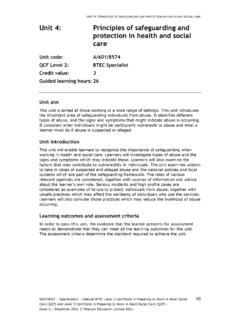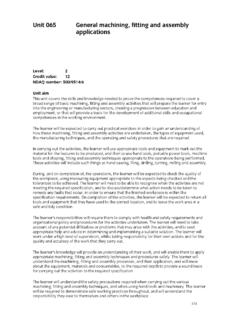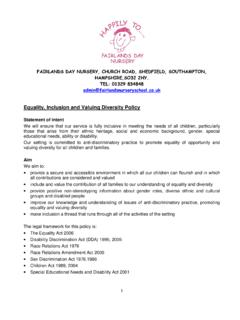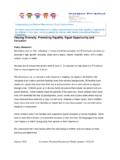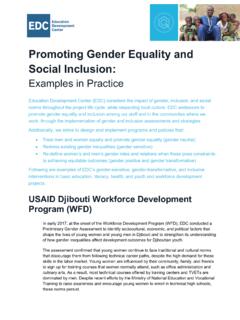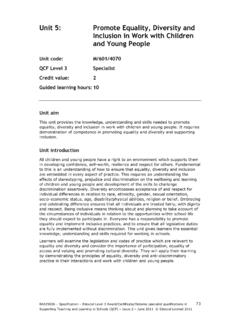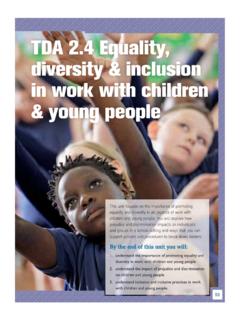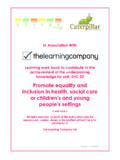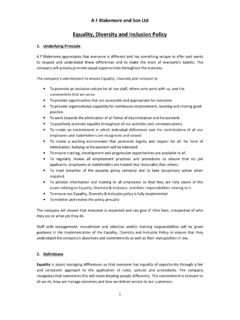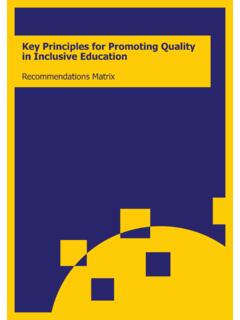Transcription of Unit 3: Champion Equality, Diversity and Inclusion
1 N031277 Specification Edexcel Level 5 Diploma in Leadership for Health and Social Care and Children and Young People s Services (England) (QCF) Issue 2 April 2012 Pearson Education Limited 2012 57 Unit 3: Champion equality , Diversity and Inclusion Unit code: SHC 53 Unit reference number: Y/602/3183 QCF level: 5 Credit value: 4 Guided learning hours: 34 Unit summary The purpose of this unit is to assess the learner s knowledge, understanding and skills required a whole systems approach to equality , Diversity and Inclusion . The unit explores models of practice and requires demonstration of skills and understanding of systems and processes. Assessment requirements This unit must be assessed in accordance with Skills for Care and Development's QCF Assessment Principles.
2 Learning outcomes 2 and 4 must be assessed in the work setting. Assessment methodology Learners can enter the types of evidence they are presenting for assessment and the submission date against each assessment criterion. Alternatively, centre documentation should be used to record this information. N031277 Specification Edexcel Level 5 Diploma in Leadership for Health and Social Care and Children and Young People s Services (England) (QCF) Issue 2 April 2012 Pearson Education Limited 2012 58 Content 1 Understand Diversity , equality and Inclusion in own area of responsibility Models of practice that underpin equality , Diversity and Inclusion in own area of responsibility: eg egalitarianism, equity, equality of opportunity, rights, privacy, individuality, independence, dignity, respect, partnerships respecting Diversity , empowerment, equality of care, individual rights, individual choice, acceptance, confidentiality, redress, person-centred practice, wishes and needs, supporting privacy and dignity, allocating resources, current codes of practice, partnership working, quality assurance systems, protection from abuse and harm, support and attention for individuals, family, friends, carers, groups and communities, the European Union, local government, unions, meeting national minimum standards, responding to national initiatives.
3 Complaint procedures Potential effects of barriers to equality and Inclusion in own area of Responsibility: the law and effects on organisation when barriers exist eg breaking the law and outcomes, self-esteem, self-concept, mental health, physical health, unsafe environment, harm and abuse; critical reflection; the cycle of oppression; learned helplessness; disempowerment, diminished life chance; social exclusion; being marginalised; poor interpersonal interactions and communication; risk assessment and case for action; new organisational structures and systems; lack of group cohesiveness; differing personalities; the media; prejudice; implications of non-compliance eg financial, legal, moral, health The impact of legislation and policy initiatives on the promotion of equality , Diversity and Inclusion in own area of responsibility.
4 As relevant eg Every Child Matters, Rights to Action, The Equal Pay Act 1975, The Disability Discrimination Act 1995, Race Relations Act 1976, The Children Act 1989, The Children Act 2004, The NHS and Community Care Act 1990, The Data Protection Act 1984, The Mental Health Act 1983, Sex Discrimination Acts 1975 and 1986, Care Standards Act 2000, Care Homes Regulations 2001, European Convention on Human Rights and Fundamental Freedoms 1950, The Convention on the Rights of the Child 1989, Human Rights Act 1998, The Disability Discrimination Act 2005; Codes of Practice eg Code of Practice for Social care Workers and Code of Practice for Employers of Social Care Workers, Charters, Organisational Policies; The Patient s Charter; changes to practice, development and improvement needs; inter-professional working; how legislation impacts/shapes practice through own policies and codes of practice N031277 Specification Edexcel Level 5 Diploma in Leadership for Health and Social Care and Children and Young People s Services (England) (QCF) Issue 2 April 2012 Pearson Education Limited 2012 59 2 Be able to Champion Diversity , equality and Inclusion promote equality , Diversity and Inclusion in policy and practice: articulating own values and beliefs regarding eg embracing Diversity , recognising equality , respect and tolerance, non-judgemental attitudes, anti-discriminatory practice, the importance of challenging overt and covert discrimination.
5 Use of legislation; codes of practice; charters; staff training and CPD; keeping up to date with new developments; supervision; roles and accountability; quality assurance systems; record keeping; monitoring and evaluating processes; auditing; inspecting the workplace; management structure; meetings; workshops; principles of good practice; record keeping; enforcement and compliance; activities and opportunities for promotion Challenging discrimination and exclusion in policy and practice providing others with information about the effects of discrimination: positive and negative effects; short and long-term effects eg health problems, unemployment, inequality; policy and practice reforms; roles and responsibilities; reduced productivity; reduced client numbers; redress The impact of Inclusion : eg self-esteem, self concept, health, equality , respect, valued; improvements eg health, recovery rate, future progress, increased productivity, effective team and partnership working, increased client numbers, successful business The value of Diversity : eg increased knowledge of other cultures, religions, age, gender, sexuality; increased opportunities; enterprise Support others to challenge discrimination and exclusion: eg positive culture, training and CPD opportunities, own and others contributions, responsibilities for management of practice, a safe environment, monitor and review.
6 Dilemmas eg risk-benefit analysis, risk to self and others, resource implications, differing priorities between stakeholders/partners; promoting principles of good practice; reviewing practice; updating of policies and procedures, SWOT analysis 3 Understand how to develop systems and processes that promote Diversity , equality and Inclusion How systems and processes can promote equality and Inclusion or reinforce discrimination and exclusion: using relevant legislation; anti-discriminatory practice to combat eg racism, ageism, sexism; in-house policies and codes of practice; audit of practice; staff appraisals; client/family questionnaire; actions from questionnaire results; sharing good practice and partnership working The effectiveness of systems and processes in promoting equality , Diversity and Inclusion in own area of responsibility: specific improvements to individual client/staff eg health, self esteem, self-concept, staff happiness and productivity, timescales; effective communication of others evaluations and use of for reforms in processes and systems Propose improvements to address gaps or shortfalls in systems and processes: plans; team meeting; roles and responsibilities; timescales; audit; policy reform.
7 Allocation of resources N031277 Specification Edexcel Level 5 Diploma in Leadership for Health and Social Care and Children and Young People s Services (England) (QCF) Issue 2 April 2012 Pearson Education Limited 2012 60 4 Be able to manage the risks presented when balancing individual rights and professional duty of care Ethical dilemmas that may arise in own area of responsibility when balancing individual rights and duty of care: confidentiality versus disclosure; protection issues relating to individuals and to communities; sharing data between professionals; conflicts between principles of good practice and the values of others; rights and responsibilities of users of the service versus care workers and others; challenging behaviour; conflict; facilitator; advocate; advisor; counsellor; mentor; personal values and beliefs; legal responsibilities of disclosure The principle of informed choice: eg professional, family, individual, child, the elderly; enabling environment; supporting others to make informed choices about the services they receive; making an informed choice; implementing an informed choice; decision making for both short term and long term; culture; values; views; unbiased information; evidence-based information.
8 Options Issues of individual capacity may affect informed choice: eg physical health, mental health, the law, social class, culture, religion, age, ability, gender, location, family support, carer support, social mobility, communication and interpersonal skills Propose a strategy to manage risks when balancing individual rights and duty of care in own area of responsibility: risk assessment and appropriate procedures; action plans; team meetings; monitoring and review; relevant legislation; roles and responsibilities; partnership working to include family and friends N031277 Specification Edexcel Level 5 Diploma in Leadership for Health and Social Care and Children and Young People s Services (England) (QCF) Issue 2 April 2012 Pearson Education Limited 2012 61 Learning outcomes and assessment criteria Learning outcomes Assessment criteria Evidence type Portfolio reference Date 1 Understand Diversity , equality and Inclusion in own area of responsibility Explain models of practice that underpin equality , Diversity and Inclusion in own area of responsibility Analyse the potential effects of barriers to equality and Inclusion in own area of responsibility Analyse the impact of legislation and policy initiatives on the promotion of equality , Diversity and Inclusion in own area of responsibility 2 Be able to Champion Diversity , equality and Inclusion promote equality .
9 Diversity and Inclusion in policy and practice Challenge discrimination and exclusion in policy and practice Provide others with information about: the effects of discrimination the impact of Inclusion the value of Diversity Support others to challenge discrimination and exclusion 3 Understand how to develop systems and processes that promote Diversity , equality and Inclusion Analyse how systems and processes can promote equality and Inclusion or reinforce discrimination and exclusion N031277 Specification Edexcel Level 5 Diploma in Leadership for Health and Social Care and Children and Young People s Services (England) (QCF) Issue 2 April 2012 Pearson Education Limited 2012 62 Learning outcomes Assessment criteria Evidence type Portfolio reference Date Evaluate the effectiveness of systems and processes in promoting equality , Diversity and Inclusion in own area of responsibility Propose improvements to address gaps or shortfalls in systems and processes 4 Be able to manage the risks presented when balancing individual rights and professional duty of care Describe ethical

